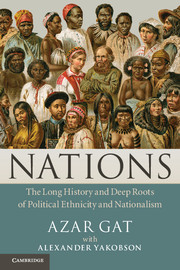Book contents
- Frontmatter
- Contents
- Acknowledgments
- 1 Introduction: is nationalism recent and superficial?
- 2 The evolution of kin–culture communities
- 3 From tribes to statehood
- 4 Premodern ethne, peoples, states, and nations around the world
- 5 Premodern Europe and the national state
- 6 Modernity: nationalism released, transformed, and enhanced
- 7 State, national identity, ethnicity: normative and constitutional aspects
- Conclusion
- Notes
- Index
6 - Modernity: nationalism released, transformed, and enhanced
Published online by Cambridge University Press: 05 February 2013
- Frontmatter
- Contents
- Acknowledgments
- 1 Introduction: is nationalism recent and superficial?
- 2 The evolution of kin–culture communities
- 3 From tribes to statehood
- 4 Premodern ethne, peoples, states, and nations around the world
- 5 Premodern Europe and the national state
- 6 Modernity: nationalism released, transformed, and enhanced
- 7 State, national identity, ethnicity: normative and constitutional aspects
- Conclusion
- Notes
- Index
Summary
Modernization has been the most profound transformation that human societies have undergone since the adoption of agriculture, and has deeply affected the national phenomenon. Europe and the West pioneered and led the modernization process for centuries, but other parts of the world have been catching up. Several major developments enhanced nationalism during the early modern period. Print technology greatly reinforced linguistic–national “imagined communities,” which shared in a continuously expanding medium of books, journals, and newspapers. Rising commercial capitalism created economies on a national and international scale and diminished local autarky. Absolutism strengthened central state control over the realm; but government by representatives on a country-state scale – progressively emerging by the eighteenth century in Holland, Britain, the United States, and Revolutionary France – had an even greater leveling and integrative effect. Fully-fledged, explosive modernity began around 1800, as commercial capitalism gave rise to industrialization and its multifarious upshots. Societies have become overwhelmingly urban rather than rural. The expansion of communication and exchange networks has accelerated exponentially. Populations have become fully literate, as large-scale education systems became standard. Modernists have variably stressed intensified communication, industrialization, and popular government as the prime factors behind the age of nationalism. But all of the above had an effect and all were mutually related and mutually reinforcing.
Indeed, there is scarcely a dispute between traditionalists and modernists about any of these changes or about the fact that every aspect of life has been radically transformed by the process of modernization, including the national phenomenon. However, were nations and nationalism transformed and greatly enhanced by modernity, or did they actually originate with it? As we have seen so far in this book, sentiments of kin–culture identity, affinity, and solidarity on a country-state scale very much existed before modernity. Moreover, they were highly potent politically, largely underpinning the frontiers of loyalty and thus borders among, and power relations within, political communities. The politicization of ethnic difference goes as far back as the beginning of politics itself. We now turn to examine the modernity transformation more closely.
- Type
- Chapter
- Information
- NationsThe Long History and Deep Roots of Political Ethnicity and Nationalism, pp. 244 - 327Publisher: Cambridge University PressPrint publication year: 2012



